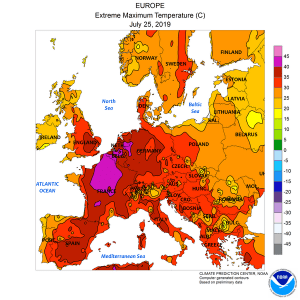Record heat waves around the world are making 2019 one of the hottest summers on record as we enter a new normal that could have been prevented decades ago.
It’s a new normal that will no doubt be written off by some as the same old normal with new politics. If you’re lucky, you’ll read about it in headlines from far-off media outlets, and if you’re not, you’ll feel it in your own neighborhood. Avoiding it would have been too hard, too expensive, and bad for the growth economy, so now we’re likely stuck with it. What is it? The heat.
It’s summer (at least in the Northern Hemisphere) and climate denialists will say that it’s no news flash that “summer is hot,” just like they’ll say that winter snow proves that the climate crisis is fake news. However, it’s not your imagination, the world really is changing before our eyes, faster than scientists expected. You know the drill, you’ve heard it before: more frequent and more intense storms, too much water in some places and not enough in others, species that must move to escape the heat or die, rising sea levels, slower moving weather patterns, and overall, an upset of the relatively stable climate that fostered agriculture and the rise of civilization for our species.
Here’s a quick rundown of the season so far:
New Delhi, India, set a new record for the hottest temperature ever recorded in June: 118.4°F (48°C), with some other locations hitting 122°. San Francisco reached 100°F on the same June day, its hottest recorded temperature in the months of June, July, or August. Heat waves also scorched Finland, Japan, the Middle East, and Africa.

Later in June, hot Saharan air moved north, bringing record heat to Europe. Paris, at 104°F, closed schools, banned high-emission vehicles from the roads, and converted fire hydrants into fountains. German road surfaces deteriorated at 103°F. Spain, at 100°F, battled wildfires believed to have been sparked by a pile of manure that self-ignited. The continuing heat killed thousands of chickens in sweltering industrial sheds in the UK.
July brought the heat wave to America, stunting the crops of Midwestern farmers who were already hard-pressed after this spring’s floods. In New York, power outages cut off air conditioning for almost 50,000 of ConEd’s most at-risk customers.
Over 100 wildfires burnt nearly 10 million acres across Alaska and Siberia, so large an area that the smoke could be seen from space. The heat wave accelerated the melting of Greenland’s ice sheet, which lost 217 billion tons of ice in July alone. Melting ice is made worse by the soot from wildfires, which darkens the surface and captures more heat. The heat also seems to be accelerating methane venting from the Arctic basin, setting up a feedback loop that will cause more atmospheric heat retention in the near future.
In addition to all of these concerns, increasing heat is also a national security threat. Hot weather contributes to violence (including suicide). Heat also brings drought and famine, which drive people to leave home and head somewhere, anywhere they might find a better life, a key reason that so many Guatemalans are heading to the United States, despite the threats posed at the border. Meanwhile, the American military is increasingly at risk of heat-related medical emergencies, especially among the Marine Corps. In 2018, 2,792 cases of heatstroke or heat exhaustion were recorded among active duty servicemembers.
With the need for action becoming more dire, it’s worth remembering that we could have prevented this. The U.S. government and major oil corporations knew about the risks of climate change in the 1970s, but instead of acting in our best interests, the information was downplayed and companies sowed doubt through a misinformation campaign similar to the one used by Big Tobacco to keep people smoking despite the health risks. The current administration is continuing with the same head-in-the-sand policy, scrubbing mentions from government websites and science from policy. After the White House blocked a State Department report on climate change and national security from being noted by Congress because it didn’t fit with the Trump Administration’s policy of denial, Dr. Rod Schoonover, the senior analyst who worked on the report, quit in disgust. When one’s ideology trumps reality for profit, how long can it be until we finish circling the drain and finally go down?
The heat is on. Tell me, can you feel it?
Related: Who’s Right, the IPCC Report or Trump?


Join the conversation!